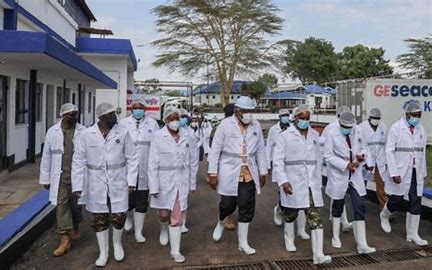The Ministry of Defence particularly the KDF has turned around the fortunes of Kenya Meat Commission. KMC makes Kshs. 3.6 Billion annually from a meager less than Kshs. 5 Million.
According to the sales report by the KMC, every month they make sales amounting to Kshs. 300 Million. In the first quarter of the year, the firm has been able to cash out Kshs. 150 Million.
KMC was revamped at the tune of Kshs. 80 Million in 2020 after the KDF takeover and relaunched in May 2021 by President Kenyatta. The KDF further went on to inject Kshs. 1.4 Billion to KMC after the National Assembly approved the expenditure.
Before the takeover, the commission handled between 8 to 10 cattle per day. Currently, they operate at 300 heads of cattle with 147 heads the minimum on a single day.
Managing commissioner of KMC, Brigadier James Githaga in a live interview with Citizen TV credited the high turnover and flourishing business to the efficiency and transparency in running the commission.
“Currently we are doing sales of more than Kshs. 300 Million. In terms of procurement, initially, we had a supplier base of 20 farmers but we have increased that to over 1,200 farmers,” the Brigadier stated.
“What we have done is to ensure that the operations at the factory are efficiently run and to keep this plant running, we ensure that we pay suppliers in under 72 hours.”
To add value to the operations of the Kenya Meat Commission, KDF officials have embraced other products that are packaged to increase the market value of KMC.
“When we took over, all the machines that operated along the processing lines were broken but now we have them up and running and we are currently doing over 42,000 cans of canned beef that is supplied to the disciplined forces in the country, which they were initially importing.”
The Chief Grader at KMC, Joyce Gichuru, affirmed that since president Uhuru Kenyatta handed the commission to the firm, the first thing that they owe to their vast success is how they managed to repair all the broken machines.
“The machines were initially run down and that hindered how we were doing our work, but now we are able to do 300 during the day and 300 at night if the demand is high,” said Gichuru.
Family Business: How Enashipai Resort Siblings Do It
Before President Uhuru transferred the operations, KMC was among the parastatals that were put on the ‘for sale’ list in a privatization bid due to a lack of raw material and a very old abattoir plant. The commission was nearly killed off until the Kenya Defence Forces came to its rescue.
Currently, the KDF is seeking an ISO certification to allow them to export the meat products outside the country and expand by franchising the meat retail shops in different parts of the country to get the products closer to the market.
The KMC, founded in 1950 through an act of parliament to provide a ready market for livestock farmers and provide high-quality meat and meat products to consumers has its headquarters at Athi River off Mombasa road.
On the 26th of June, 2006, the commission was reopened after 15 years of closure, to promote the meat industry in Kenya, both locally and internationally.
The Kenya Meat Commission has two abattoirs, in Athi River (largest) and Kibarani, Mombasa off the Makupa causeway.
It has two sales and distribution depots, in Landhies Road, Nairobi and Shimanzi in Mombasa. The KDF have proved that they are capable of running and managing a nearly dead parastatal.








